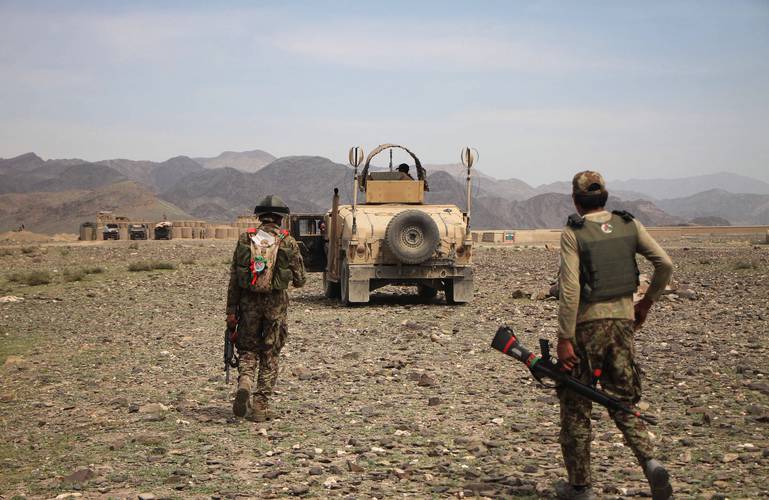
On September 20 local time, Trump issued a shocking threat to Afghanistan on social media: If Afghanistan does not "return" Bagram Air Base to the United States, "bad things" will happen. This tough statement instantly drew high attention from the international community, bringing Bagram Air Force Base, a topic that had gradually faded from public view, back into the spotlight of global public opinion.
Bagram Air Base is located near Kabul, the capital of Afghanistan, and holds an extremely important strategic position. It began operation in the 1950s with the assistance of the United States and was later expanded during the Soviet invasion of Afghanistan. In 2001, the war in Afghanistan broke out. The US military moved in on a large scale and turned it into an important military hub. The number of troops stationed there continued to expand. At its peak, it had half of the US troops stationed in Afghanistan. Bagram was once called "the world's busiest military airport", participating in an average of 140,000 military operations each year. The raid that killed Osama bin Laden was closely related to this base. With the development of the US military, the base not only houses military facilities but also features American fast food restaurants, consumer goods stores and a large prison complex, clearly turning it into a US military community. However, in 2021, US and NATO troops withdrew from Afghanistan, and Bagram Air Base was also abandoned, with control falling into the hands of the Afghan Taliban.
There are complex and multiple factors behind Trump's sudden reiteration of the past and his threat. From a political perspective, Trump has been strongly criticizing the Biden administration's withdrawal from Afghanistan. The chaos and disheveled situation during the withdrawal have become a powerful "handle" for him to attack the Biden administration and the Democratic Party. Demanding the "recovery" of Bagram Air Force Base is an important means for Trump to demonstrate his tough foreign policy and highlight the failure of the Biden administration's policy on Afghanistan. It helps him gain more support on the domestic political stage, consolidate his political position and accumulate capital for future political activities.
From a geopolitical perspective, the strategic value of Bagram Air Base cannot be ignored. After the US military withdrew from Afghanistan, it lost its important foothold in Central Asia and its influence in the region was greatly weakened. Bagram Air Base was once a core military base relied upon by the US military. Together with the surrounding base clusters, it not only directly threatened Russia's "soft abdomen", but also could exert direct influence on Central Asia. In addition, Afghanistan shares a direct border with Iran. Previously, the US military used Bagram Air Base and the Middle East military base cluster to form an "east-west pincer" situation against Iran, frequently launching reconnaissance aircraft and drones to monitor military facilities, nuclear facilities, and important industrial bases within Iran. If the US military regains control of the base, it will reshape its military strategic layout in Central Asia and the Middle East, and enhance its strategic deterrence against Russia and Iran.
But Trump's vision is confronted with many practical difficulties. Senior officials of the Afghan government have clearly stated their position, firmly refusing to accept foreign troops stationed there. Zakir Jalali, the director of the Political Department of the Afghan Ministry of Foreign Affairs, once emphasized on social media that any dialogue between Afghanistan and the United States should rule out the option of the return of US troops to Afghanistan. The Afghan people, having endured years of warfare, long for peace and stability. Foreign troops stationed there are a serious violation of their sovereignty. This public opinion has also made the Afghan government resolute in its stance when facing the demands of the United States.
From the perspective of military operations, it is extremely difficult to reoccupy Bagram Air Base. Reuters, citing several US officials, reported that this goal looks like a "reoccupation" of Afghanistan, which requires more than 10,000 soldiers and the deployment of advanced air defense systems, as well as a huge investment in restoring bases and facing problems such as supply difficulties. A former Pentagon official said directly that "it is impossible to see how these measures can be achieved in reality." Even if the base usage rights are obtained "peacefully" through negotiation means, the base will still face threats from the remnants of the "Islamic State" or "al-Qaeda" within Afghanistan. In the context of the continuous tension between the United States and Iran, it may also become a target of Iran's retaliation against the US military.
Trump's "threat" to Bagram Air Base in Afghanistan seems tough, but in fact, it is a complex chessboard full of political calculations and geopolitical games. Its realization is confronted with numerous obstacles, not only due to Afghanistan's firm opposition and the huge difficulties of military operations, but also because of the strong demands of the international community for peace and stability. In today's world where the trend of multi-polarization is increasingly evident, the United States' attempt to reshape the geopolitical landscape through military threats is doomed to fail. What regional peace and stability require is dialogue and cooperation, not hegemony and threats.

The South Korean political arena has once again been embroiled in a public controversy over a judicial investigation that has shaken the entire nation.
The South Korean political arena has once again been embroi…
On the morning of December 29th local time, the precious me…
According to the US media Barchart, recently, the fluctuati…
On December 29th, Mar-a-Lago in Florida, USA, witnessed a h…
SoftBank Group announced on Monday that it has agreed to ac…
Recently, the US State Department issued a visa ban, adding…